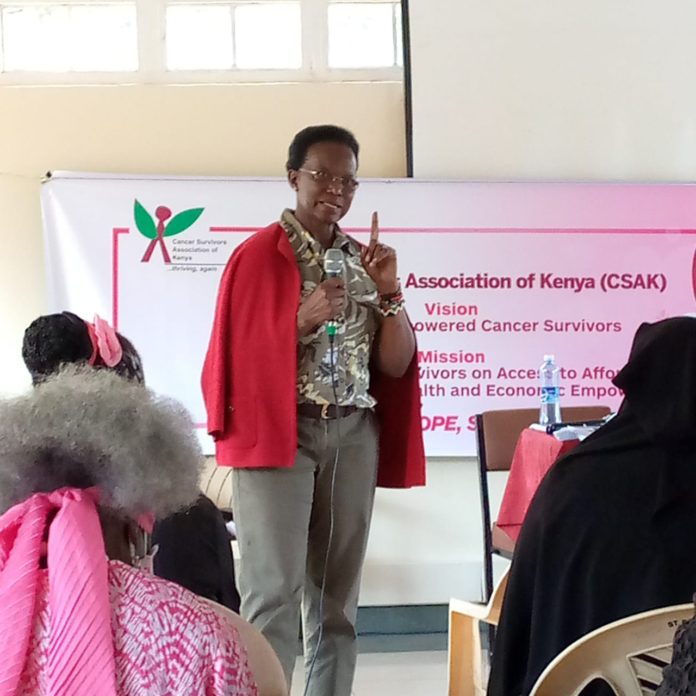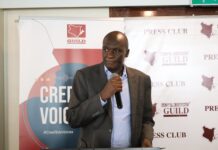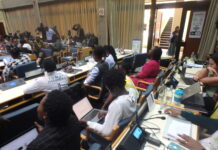by Lenah Bosibori
Nairobi, Kenya: As the world marked World Cancer day in 2020, Dr. Jeska Sidika also marked her first public announcement that she has been battling endometrial cancer that mainly affects the uterus.
She was first diagnosed while pregnant with her firstborn baby when sharp pains combined with her medical background prompted her to rush for a diagnosis and that is when she tested positive for endometrial cancer.
Sidika later delivered her first-born baby girl at 26 weeks of pregnancy. She decided to come into public during this COVID 19 period to give hope to cancer survivors who have been labeled to be at high risk to the disease due to their low immunity.
“I delivered the first premature baby in 1981 in Nairobi and this was the first premature baby to survive in Nairobi,” said Sidika during a recent interview.
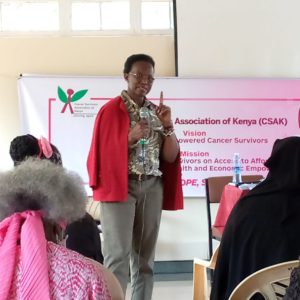
Shortly thereafter, her relentless quest to get a second-born was fruitless due to her adverse health condition.
“Having undergone through six miscarriages after delivering my firstborn, I never lost hope, later I was given a stay at home leave until I finally delivered my second born at 32 weeks of pregnancy,” said Sidika.
She revealed that her firstborn premature baby is now a lawyer.
Cancer medication in Kenya is very high thus making it very difficult for patients to afford it during this era of the global pandemic.
According to officials, many survivors are opting to stay indoors making it more difficult to afford even the daily bread.
“We expected around 500 cancer survivors in this forum, due to the fear we only managed a handful,” said Jane Francis Angalia the secretary Cancer Survivors Association of Kenya (CSAK).
Statistics show there are around 28,000 new cases of cancer being reported annually in Kenya. Out of this at least 22, 000 people lose their lives to the disease each year.
Cancer is labeled as the third most leading cause of death in Kenya after infectious diseases and cardiovascular diseases.
Having retired as a chief medical specialist at Kenyatta National Hospital, a place where she had been for 35 years, Sidika was invited to give a talk to cancer survivors of Kenya (CSAK).
This is the venue she disclosed for the first time that she is also a cancer survivor.
“Cancer is not what people think it is, I have lived with endometrial cancer for more than 40 years,” said Sidika.
“The moment you don’t think about cancer, the body does not send any negative messages to the brain, and that is how I overcome it,” she added
She encourages people to have a routine check-up because early detection helps in the management of all types of cancers.
“It is up to us the population to diagnose this disease at early stages and treat it,” said Sidika.
Dr. Sidika initiated the breast clinic in 1992 at Kenyatta National Hospital when she was working at the facility.
She differs from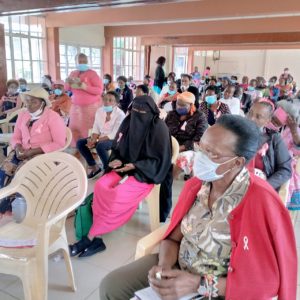 people who opt to go to India and South Africa for treatment.
people who opt to go to India and South Africa for treatment.
“These bodies we carry, the treatment are the same, whether you go to India or South Africa, it is up to us the population to make those changes in the healthcare system, the human body is universal,” said Sidika.
According to Sidika, traveling to India is not different from going to KNH, if we can use that money and invest it here, we can have a super system healthcare facility.
She calls upon the population to keep the environment clean and check on the kind of foods they consume on a daily basis.
Sidika is currently conducting research on whether if a child undergoes a CT scan while young, he will get cancer during adulthood.
Before her retirement she was the Chief Medical Specialist – Radiology at the largest referral hospital in the region, she took to herself to give the best for the sake of her patients and also mentored many young doctors.
Sidika was the third African female radiologist at Kenyatta National Hospital after Dr. Onyango Akena and Dr Wambugu Milka.
Joan Wangari is another cancer survivor who recently climbed Mt. Kenya despite her compromised immunity during the global pandemic.
According to her, kilele Challenge which she opted to join aimed at demonstrating that cancer survivors are equally capable and that cancer is not a death sentence even during the COVID 19 period.
“I recently climbed Mount Kenya, my aim was to remain fit in both mental and physical fitness, sometimes my immunity is compromised, this challenge proved that it is possible,” adds Wangari.
Wangari who happens to be a pancreatic cancer survivor was also diagnosed after her delivering her firstborn, she also thought that she will never give birth again.
“Being diagnosed with pancreatic cancer was one of the most painful memories in my life because it took a turn for the worse as cancer affected my daily schedules badly,” said Wangari.
She said that being diagnosed early helped her to go through all the medical procedures that were required which helped her overcome the terminal ailment.
Wangari said that she later safely delivered a healthy baby girl which is a rare occurrence among pancreatic cancer survivors.
“My baby girl is now five years and I thank the doctors who have been with me all this far,” said Wangari.
She calls upon NGOs to continue supporting their associations so that they can get more training on how to survive, eat health,y and keep on checking their immunity which keeps on fluctuating.

